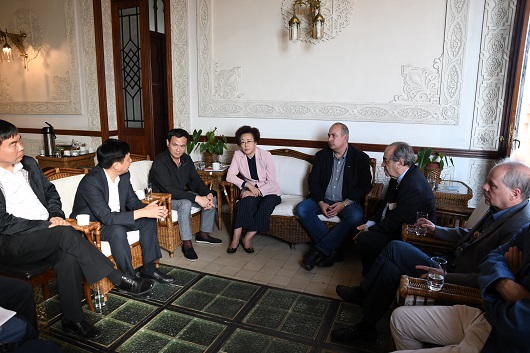Brazil-China partnership moves forward with visit of vice-mayor of Shenzhen and workshop
16/08/2019
Gardênia Vargas (CDTS/Fiocruz) and Julia Dias (AFN)
The vice-mayor of the Chinese city of Shenzhen, Wu Yihuan, visited Oswaldo Cruz Foundation (Fiocruz) on 24 June, when her delegation met with Fiocruz representatives. The meeting was attended by the vice-president of Production and Innovation In Health (VPPIS), Marco Krieger, who was representing the presidency; the coordinator of the Center for Technological Health Development (CDTS), Carlos Morel; the vice-president of Research and Biological Collections, Rodrigo Correa de Oliveira; and the coordinator of the Fiocruz Strategy for the 2030 Agenda (EFA2030), Paulo Gadelha.

Photo: Peter Ilicciev
“Shenzhen is impressive because it is a young city, but it has nonetheless become a technological power in China”, stated Carlos Morel, Fiocruz researcher in charge of the cooperation with China. Only 40 years after its foundation, today the city is one of the world’s most thriving and is the leader of Chinese technological innovation.
Wu Yihuan explained that today the city has a strategic plan focused on health. “The country has a strategy to build a healthy China, so public health is one of our city priorities”, she said. To achieve this goal, she hopes to strengthen cooperation with the Foundation. “China has great technology, but Fiocruz has qualified personnel. We need to exploit the best each side has to offer”, emphasized the representative, whose job includes public health attributions and management of the city hospitals.
Fiocruz has three Memorandum of Understanding (MoU) with China. One of them, signed in Shenzhen in February 2018, involves four Chinese institutions: the Shenzhen Popular Hospital, the Beijing Genomic Institute (BGI), the Pathogenic Microbiology Laboratory of the Immunologic Microbiology Institute at the Chinese Academy of Science, and the telecommunications company ZTE. The partnership proposed the creation of two Brazil-China centers for Infectious Diseases Research and Prevention Centers (IDRPC), one in Brazil (at Fiocruz) and another in China, focusing on epidemics that hit both countries. The two other documents were signed between Fiocruz and the Chinese CDC , in November 2017, and between Fiocruz and the Chinese Academy of Science, in November 2018.
During this time, the partners have strengthened ties with mutual visits, publications in magazines and constant communication about shared interests. In a demonstration of the partnership, the Beijing Institute of Genomics lent two state-of-the-art genetic sequencing machines to Fiocruz. This is the first shipment of this kind to Brazil. The equipment should start operating at the Immunobiological Technology Institute (Bio-Manguinhos / Fiocruz) in the next months.
During her visit, the vice-mayor took time to get to know the place of the future building of the Center for Technological Health Development (CDTS/Fiocruz) and the laboratory where the two latest-generation genetic sequencing machines will be installed.
Workshop on Infectious Diseases
In the same week, on June 26, Fiocruz and the Chinese Academy of Sciences held the second academic workshop of China and Brazil (the first was in July 2017). At the time, Chinese researchers presented their studies on infectious diseases to Brazilian researchers of Fiocruz.

Photo: Peter Ilicciev
“It is important to celebrate the continuity of this partnership and to make this debate about the future and past of the collaboration between Brazil and China. They show what is distinct in their research, and thus, promote the cooperation and development of projects. For us, it is a way of thinking about technology transfer for the improvement of research in Brazil,” explains Thiago Moreno, researcher at the Center for Technological Development in Health (CDTS / Fiocruz).
One of the highlights of the workshop was the study of Song Hao Mechanism of viral entry of the chikungunya virus, carried out in partnership with the CDTS / Fiocruz, through researcher Leonardo Vazquez. Other researchers attending the Workshop were: Cheng Gong (Study on the mechanism of tropical virus infection), Zhong Jin (Development of prophylactic vaccine against HCV), Wu Yan (Study on protective antibody of Burnia virus), Shi Zhengli (Corana virus - CoV - associated with animal and human diseases), Shi Yi (Replication of Influenza virus and development of antivirals), Zhu Shu (Intestinal Immune-Enteric Viruses Interaction in Health and Diseases).
“For us, it is important to continue this partnership, in which we hope to be able to show more of what we do and to know more about what and how Brazil develops in the area of health. Our meetings are to talk about this collaboration, to discuss the best way for it to move foward and so that, in the future, more exchanges such as these, more research and publication of joint articles may take place,” says researcher Shi Yi.
After the visit to Fiocruz in Rio de Janeiro, the researchers went to Manaus to see laboratories and discuss the development of international collaboration projects. “One of the researchers, while working in China, showed us a video of the work done by Fiocruz in Manaus. A research station on a boat. This is amazing! We want to know how they collect the samples and work on them there,” Yi explains.
Among the new projects proposed for this partnership between the countries is the Center for Excellence in Emerging Infectious Diseases (CEEID), a joint effort with The World Academy of Sciences (TWAS) to increase readiness for new epidemics.


